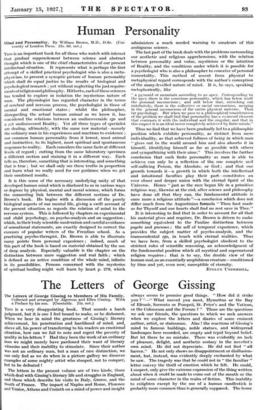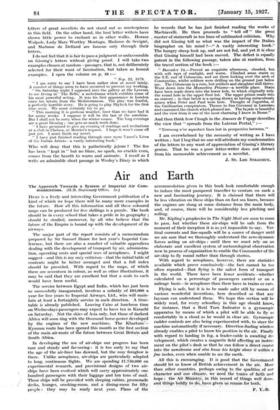The Letters of George Gissing
Tins is a very disappointing book. That sounds a harsh judgment, but it is one I feel bound to make, or be dishonest. When we bear in mind the greatness of Gissing's literary achievement, his penetration and hardihood of mind, and, above all, his power of transferring to his readers an emotional situation, how can we fail to note and regret the poverty of quality in his letters ? Had they been the work of an ordinary man we might merely have pardoned their want of literary vitamins and their inability to stimulate. Since their author was not an ordinary man, but a man of rare distinction, we can only feel as we do when in a picture gallery we discover examples of some mighty artist who stooped, not to conquer, but to be defeated I The letters in the present volume are of two kinds, those Which deal with Gissing's literary life and struggles in England, and those which describe his visits to Italy, Greece, and the South of France. The impact of Naples and Rome, Florence and Venice, Athens and Corinth on a mind of power and insight always seems to promise good things. " How did it strike you ? "—" What moved you most, Hymettus or the Bay of Eleusis, Sorrento or Pompeii, St. Peter's and the Vatican, or the Colosseum and the Forum ? " Those are the questions we ask our friends, the questions to which we seek answers when we explore the letters and diaries of some eminent author, artist, or statesman. Alas 1 the reactions of Gissing's mind to famous buildings, noble statues, and widespread landscapes here recorded, are empty and tepid beyond belief. But let there be no mistake. There was evidently no lack of pleasure, delight, and aesthetic ecstasy in the novelist's own mind. He did not depreciate. He did not find " all barren." He not only shows no disappointment or disillusion- ment, but, instead, was evidently deeply enchanted by what he saw. The tragedy was that he could not in " the familiar " letter convey the thrill of emotion which he felt. He could, I suspect, only give the extreme expression of the thing written about when it could be made to come out of the mouth or the mind of some character in the realm of fiction. This inability to enlighten except by the use of a human candlestick is probably more common than is generally supposed; The home fetters of great novelists do not stand out as masterpieces in this field. On the other hand, the best letter writers haVe shown little power to enchant us in other walks.. Horace Walpole, Lady Mary Wortley Montagu, Madame de Seirigne, and Madame de Deffand are famous only through their letters.
I do not feel that it is fair to pass a judgment so unfavourable on Gissing's letters without giving proof. I will take two examples chosen at random—passages, that is, not deliberately selected for their want of fascination, but taken as honest examples. I open the volume on p. 48 :— " Sep. 22, 1879.
I am sorry to say I have been rather slow at novel lately. A number of things seem to have occurred to prevent my working.
" On Saturday night I squeezed into the gallery at the Lyceum to see Irving in The Bells,' a melodrama which exhibits some of his most powerful acting. It, was his first appearance in London since his return 'from the Mediterranean. The play was fearful, a perfectly horrible story. He is going to play Shylock for the first time soon. We must certainly try to go. " This morning it is glorious weather, finer than we have had it for many weeks. I suppose it will be the last of the sunshine. But I shall not be sorry when the winter comes. The long evenings are a great blessing ; one gets so much work done. I have promised to give an evening of readings and recitations at a club in Chelsea, at Mercier's request. I hope it won't come off just yet. I must finish my novel.
" 1 have just fiiiished reading through once more Vasari's Lives of the Italian Artists—a vastly interesting book."
Who will deny that this is pathetically jejune ? The fire has been " kept in " but no blaze, no spark, no crackle even, comes from the hearth to warm and animate. I recall as I write an admirable short passage in Wesley's Diary in which
he records that he has just finished reading the works of Machiavelli. He then proceeds to " tell off " the great master of statecraft in ten lines of sublimated criticism. Why did not Gissing tell us what was the impact of the Italian biographer on his mind ?—" A vastly interesting book." The hungry sheep look up, and are not fed, and yet it is clear that Gissing himself had been moved. The defect is equally patent in the following passage, taken also at random, from the travel section of the book :- "December 24.—Proved an exquisite afternoon, clouded, but with soft rays of sunlight, and warm. Climbed some stairs on the S.E. end of Colosseum, and sat there looking over the arch of Constantine, whilst soldiers were drilling on the ground just below me. The Colosseum is a ruin, but soldiers and slaughter still thrive. Went down into the Mamertine Prison —aterrible place. Stairs have been made down into the lower hole, to which originally only the round hole in the upper floor led. The upper prison made into an oratory ; in that below is a spring shown as having miraculously arisen when Peter and Paul were here. Thought of Jugurtha, of the Catilinarian conspirators. Thence to San Giovanni in Lateran and examined the church which pleased me. The façade is beautiful and the view from it one of the most charming I know in Rome."
And then think how Clough in the Amours de Voyage describes the view that " spreads from the Lateran Portal," :— "Towering o'er aqueduct lines lost in perspective between."
I am overwhelmed by the necessity of writing as I have written ; but I beg that no one will attribute my condemnation of the letters to any want of appreciation of Gissing's literary genius. That he was a poor letter-writer does not detract from his memorable achievement as a novelist.
J. ST. LOE STRACHEY.



































 Previous page
Previous page